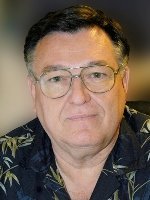 In a recent gathering at the Hukilau Marketplace PCC president and CEO Alfred Grace explained that in ancient Hawaiian times Laie was a pu’uhonua where women, children and the aged could seek sanctuary during warfare, and those who had broken the kapu or taboo system could receive absolution.
In a recent gathering at the Hukilau Marketplace PCC president and CEO Alfred Grace explained that in ancient Hawaiian times Laie was a pu’uhonua where women, children and the aged could seek sanctuary during warfare, and those who had broken the kapu or taboo system could receive absolution.
Laie continued to be a place of sanctuary in more modern times as Polynesians gathered here to practice their faith and ultimately set the stage for present day Laie. He told the story of how residents of Laie whose chapel had burned down in 1940, decided to raise funds to rebuild it by starting a hukilau program in early 1948. “This referred to an ancient Hawaiian fishing net, and in some cases — like the one in Laie Bay — it was over a half-mile long. Guests were encouraged to help huki [pull] the lau [leaves tied to the net ropes],” Grace said.
 “Then the local men would often thrill their guests by pulling fish from the net, and pose for photos by putting it in their mouth. This was a highlight: It became very popular in photos and movies, and started to put Laie on the map. This activity of pulling the lau was followed by a grand feast. You all know that, of course, as a luau,” Grace continued. “While there were other luaus, none were as popular or as well received as the hukilau ‘down in old Laie Bay,’ as it became immortalized in The Hukilau Song.’”
“Then the local men would often thrill their guests by pulling fish from the net, and pose for photos by putting it in their mouth. This was a highlight: It became very popular in photos and movies, and started to put Laie on the map. This activity of pulling the lau was followed by a grand feast. You all know that, of course, as a luau,” Grace continued. “While there were other luaus, none were as popular or as well received as the hukilau ‘down in old Laie Bay,’ as it became immortalized in The Hukilau Song.’”
“In many ways, the Hukilau ‘down in old Laie Bay’ was the forerunner of the Polynesian Cultural Center, so it’s not by chance that this marketplace — named in honor of the hukilau — stands at the forefront of the Center,” Grace said.
 He went on to say that the marketplace experience also includes passing by “a statue of the single-most iconic figure from the old hukilau, Hamana Kalili — founder of the shaka sign.” Grace explained how Kalili, a Hawaiian from Laie who had lost portions of his three middle fingers on his right hand in an industrial accident, would often wave to the visitors and children . . . and the gesture has since spread around the world.
He went on to say that the marketplace experience also includes passing by “a statue of the single-most iconic figure from the old hukilau, Hamana Kalili — founder of the shaka sign.” Grace explained how Kalili, a Hawaiian from Laie who had lost portions of his three middle fingers on his right hand in an industrial accident, would often wave to the visitors and children . . . and the gesture has since spread around the world.
“The Hukilau Marketplace is an ambitious undertaking to restore and upgrade the Polynesian Cultural Center,” Grace said. “We are thankful to all who assisted in this great effort, from those who inspired us, to those who designed and built it for us. We also acknowledge our beloved kūpuna [elders] and our labor missionaries… [and] we reminisce on those who are no longer counted among you… The spirit of the Hukilau…lives on at the Polynesian Cultural Center today.”
Later that same day was a community celebration hosted by the new 144-room Courtyard Oahu North Shore by Marriott, which is makai or seaward of the PCC’s Maori and Fijian villages.
 The program there proceeded with a strong Polynesian flavor that included more seashell trumpeting; songs by the Koolauloa Children’s Chorus, led by Esther Dela Rosa Macy; music by a Hawaiian community kūpuna choir; hula by Halau Hula O Kekela, led by Kela Miller of Laie, who also later danced an impromptu hula as Uncle Joe Ah Quin — who played the role of Moki, the father, in the Latter-day Saint movie Johnny Lingo — sang Behold Laie; and another traditional welcoming chant, this time by retired PCC Hawaiian culture and genealogy expert Cy Bridges.
The program there proceeded with a strong Polynesian flavor that included more seashell trumpeting; songs by the Koolauloa Children’s Chorus, led by Esther Dela Rosa Macy; music by a Hawaiian community kūpuna choir; hula by Halau Hula O Kekela, led by Kela Miller of Laie, who also later danced an impromptu hula as Uncle Joe Ah Quin — who played the role of Moki, the father, in the Latter-day Saint movie Johnny Lingo — sang Behold Laie; and another traditional welcoming chant, this time by retired PCC Hawaiian culture and genealogy expert Cy Bridges.
During the program, Eric Jacobs, Chief Development Officer, Marriott International for North America Lodging, presented David Preece, Chairman of the BYUH Business Management Department, which includes the BYUH Hospitality & Tourism Management program, with a $5,000 scholarship fund donation.
“Many people have been involved with this hotel, and when they share their part of it and their story, often it’s a personal one and a spiritual one,” said Chris Wood, managing partner of Laie Ventures, LLC, the ownership entity of the hotel, who represented the members of the Utah-based Wood family owners.
“The thing that excited us was the ability to help the students here at BYU-Hawaii, and also provide jobs,” he said, pointing out that 400-500 applicants applied for about 50 positions when the hotel had its “soft opening” about two months ago: “There’s a real need for jobs in the community, and we’re just blessed that we can participate, and that we came here to work with the community.”
Wood also acknowledged Lodging Dynamics, the Utah-based hotel management company that operates the Laie Courtyard. “They have found qualified, educated and hard-working local people with experience and abilities to operate this hotel. I think that goes to BYU-Hawaii educating people, and a lot of people who have gained experience at the PCC.
Story and images by Mike Foley

Mike Foley, who has worked off-and-on
at the Polynesian Cultural Center since
1968, has been a full-time freelance
writer and digital media specialist since
2002, and had a long career in marketing
communications and PR before that. He
learned to speak fluent Samoan as a
Mormon missionary before moving to Laie
in 1967 — still does, and he has traveled
extensively over the years throughout
Polynesia and other Pacific islands. Foley
is mostly retired now, but continues to
contribute to various PCC and other media.

Recent Comments